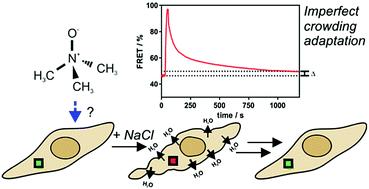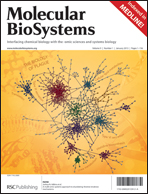Imperfect crowding adaptation of mammalian cells towards osmotic stress and its modulation by osmolytes†
IF 3.743
Q2 Biochemistry, Genetics and Molecular Biology
引用次数: 16
Abstract
Changes of the extracellular milieu could affect cellular crowding. To prevent detrimental effects, cells use adaptation mechanisms to react to such conditions. Using fluorescent crowding sensors, we show that the initial response to osmotic stress is fast but imperfect, while the slow response renders cells more tolerant to stress, particularly in the presence of osmolytes.

哺乳动物细胞对渗透胁迫的不完全拥挤适应及其渗透细胞的调节作用
细胞外环境的改变可影响细胞拥挤。为了防止有害影响,细胞利用适应机制对这种情况作出反应。利用荧光拥挤传感器,我们发现对渗透胁迫的初始反应是快速但不完美的,而缓慢的反应使细胞更能忍受压力,特别是在渗透细胞存在的情况下。
本文章由计算机程序翻译,如有差异,请以英文原文为准。
求助全文
约1分钟内获得全文
求助全文
来源期刊

Molecular BioSystems
生物-生化与分子生物学
CiteScore
2.94
自引率
0.00%
发文量
0
审稿时长
2.6 months
期刊介绍:
Molecular Omics publishes molecular level experimental and bioinformatics research in the -omics sciences, including genomics, proteomics, transcriptomics and metabolomics. We will also welcome multidisciplinary papers presenting studies combining different types of omics, or the interface of omics and other fields such as systems biology or chemical biology.
 求助内容:
求助内容: 应助结果提醒方式:
应助结果提醒方式:


